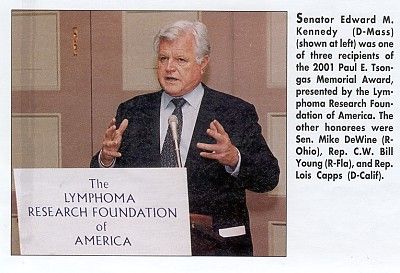Four Members of Congress Receive the 2001 Paul E. Tsongas Award
WASHINGTON-Four members of Congress received the 2001 Paul E. Tsongas Memorial Award for their contributions to forwarding cancer research and awareness of the disease. This year’s honorees were Sen. Edward M. Kennedy (D-Mass), Sen. Mike DeWine (R-Ohio), Rep. C. W. Bill Young (R-Fla), and Rep. Lois Capps (D-Calif).
WASHINGTONFour members of Congress received the 2001 Paul E. Tsongas Memorial Award for their contributions to forwarding cancer research and awareness of the disease. This year’s honorees were Sen. Edward M. Kennedy (D-Mass), Sen. Mike DeWine (R-Ohio), Rep. C. W. Bill Young (R-Fla), and Rep. Lois Capps (D-Calif).
The annual Tsongas award recognizes "outstanding legislative leadership and commitment in support of health care issues that result in improving the quality of life for all Americans."

It is presented by the Lymphoma Research Foundation of America and named for the late Sen. Paul Tsongas (D-Mass), who served as the group’s honorary chair from its inception until his death in 1997 from complications associated with his treatment for lymphoma.
The awards were presented at a Capitol Hill reception. Only Sen. Kennedy was able to attend the ceremony (see photograph). In his acceptance remarks, Sen. Kennedy noted that his son, Rep. Patrick J. Kennedy (D-RI), who was in the audience, received the Tsongas award last year.
"You see, he’s learning from me," Patrick Kennedy quipped to laughter and applause. "He’s coming along nicely."
In a more serious moment, Sen. Kennedy noted the successful work of the Human Genome Project and its potential. "When we look at the possibilities today, I firmly believe that this period of our time will be known as the time of the life sciences," he said. "It is the life sciences that are going to mark the way toward finding important paths for dealing with these challenges in lymphoma."
The senator, whose son Edward suffered from osteosarcoma as a child, also praised the efforts of advocacy groups like the Lymphoma Research Foundation. "I am all for what the government, the NIH, can do, and there is nothing that can replace that," Senator Kennedy said. "But the work this foundation doesin terms of the research it funds and in getting information outis something that is enormously important, and I hope you know that."